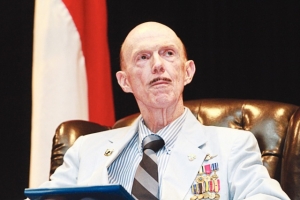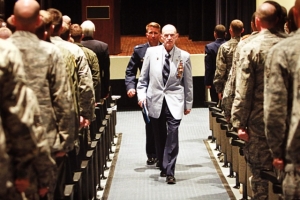One who made it home
By Kenneth Fine
Published in News on September 18, 2011 1:50 AM

News-Argus/MICHAEL BETTS
Retired Brig. Gen. Michael DeArmond is honored during the 4th Fighter Wing's POW/MIA Ceremony at Seymour Johnson Air Force Base Friday afternoon. DeArmond was a prisoner of war for 17 months after his F-86 was shot out of the sky during the Korean War.

News-Argus/MICHAEL BETTS
Airmen stand at attention as DeArmond is escorted out of the ceremony by 4th Fighter Wing Commander Col. Patrick Doherty.
From a seat hovering just above his fighter jet -- and some 27,000 feet above MiG Alley -- Michael DeArmond watched his burning F-86 explode.
Moments later, the pilot was unconscious.
And he was falling.
"I fell ... to 18,000 feet before I got enough sense to kick free of the seat," he said. "I got out and pulled ... the chute open."
But the Air Force aviator's problems were far from over.
Both of his eyeballs had been ruptured by the blast -- his neck and back "crushed."
And his parachute was guiding him toward an enemy stronghold.
His 47th combat mission over Korea was setting up to be a memorable one -- for all the wrong reasons.
By sunset, he would be a prisoner of war.
*
DeArmond grew up knowing he would serve his country.
His grandfather had raised his right hand.
His father fought in World War II.
So he was eager to join the long line of relatives who attended the U.S. Military Academy at West Point.
And after, in 1950, he graduated at the top of his class, he decided to become a pilot.
He had no idea, then, that within two years, an enemy aircraft would rob him of the ability to look over his shoulder -- that his pending marriage would be interrupted; that his parents would accept that their son was dead.
DeArmond was, quite simply, just another man in pursuit of a coveted set of pilot wings.
And in August 1951, he received them.
Less than six months later, he would arrive in Korea and join the 335th Fighter Squadron -- a unit charged with flying F-86s into combat.
"But none of us had been within 100 miles of an F-86," he said.
And after only a few days to "read the manual," he and the four others he had traveled to war with took flight.
"We got six hours in and they called us and said, 'You're now set up and ready for combat,'" DeArmond said. "Of the five guys we had, the first was dead within 10 days. The second guy disappeared in a dogfight. The third guy had his wing almost blown off and he got over a friendly island and punched out -- broke both of his ankles on the hard landing. And then, there was me."
DeArmond was "deep in MiG Alley" -- the name given by pilots to the northwestern portion of North Korea, where the Yalu River empties into the Yellow Sea -- when a MiG 15 pilot got the best of him.
"The airplane blew up as I ejected," he said. "I was going straight down at about 600 miles an hour and the airplane was on fire. When it blew in half, it knocked me unconscious."
But when he finally came to and activated his parachute, more trouble was on the horizon.
"I was heading for ... this white oak tree -- right for this damn thing," DeArmond said. "I said to myself, 'I'm pretty soon going to be dead.'"
So he put his ankles together and closed his eyes -- bracing his already broken body for its almost certain impact with the massive tree.
"But my chute took me right through (it)," he said. "I missed every piece of wood on the damn thing."
And he was met, in the ground, by friendly villagers.
"They gave me tea and told me everything was fine," he said. "But then, two guys burst in -- one with a Russian machine gun, the other with a rifle."
DeArmond, now a prisoner, was marched for miles before facing another near-death experience.
His two captors stopped him in front of a tree.
"One of the guys, he said he wanted my leather jacket," DeArmond said. "Well I told him, 'You ain't gonna get the leather jacket.' Then, the other guy picked up his rifle.
"Your stomach turns to sheer ice. I thought, 'By God, I'm dead.'"
But the man's gun wasn't loaded.
"So they started marching me again," he said.
And they didn't stop until they reached a prison camp at the mouth of the Yalu River.
*
During his visit to Seymour Johnson Air Force Base on Friday, DeArmond chose not to get into many of the details of just what transpired over the 17 months he spent in captivity.
But he did explain, to those airmen who gathered to hear him speak during the 4th Fighter Wing's annual POW/MIA Ceremony, all that unfolded when he got home -- just how much his stint as a prisoner had cost him.
Like the day his fiancée invited him to dinner.
"She told me to meet her husband. She said, 'I thought you were dead,'" DeArmond said. "And she had two children and said, 'What do you think about my two children?' I think I said, 'They're very nice.' She said, 'Well you should. They are both named after you -- posthumously.'"
Or how it felt to learn that his parents, for more than a year, had moved on as though he was never coming home.
"Both my mother and father thought I was dead," he said, looking down.
And when he thanked the men and women in the crowd for their own service, they could see -- in the way he walked; in how he couldn't quite scan their faces from one side of the base theater to the other without turning his body -- that he had sacrificed, for the cause they still defend today, much of himself, too.
